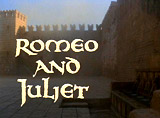
|
Romeo
and Juliet (1968, UK/It.)
In director Franco Zeffirelli's Shakespearean enduring
classic romance-drama - a tragic love story of "star-crossed
lovers" filmed on location in Italy; it was the most commercially successful Shakespeare
film and its most entertaining, refreshing and natural rendition
- a passionate celebration of young love:
- the film's prologue (a voice-over by narrator Laurence
Olivier, uncredited) - told about the ongoing, bloody feud between
two important families in Renaissance Verona and the poignant premonition
that "star-crossed lovers" [Romeo
- son of the Montague family, and Juliet - daughter of the Capulet
family] would die by the tragedy's end, finally bringing about
the reconciliation of the two bitter, warring families: "Two
households both alike in dignity, In fair Verona where we lay our
scene, From ancient grudge break to new mutiny. Where civil blood
makes civil hands unclean. From forth the fatal loins of these
two foes, A pair of star-crossed lovers take their life; Whose
misadventured piteous overthrows Do with their death bury their
parents' strife"
- the opening sword-fighting street brawl in the city
of Verona between representatives of the families of the Montagues
and the Capulets - Tybalt (Michael York), Lady Capulet's
fiery nephew (and Juliet's cousin) on one side, and Benvolio (Bruce
Robinson), nephew to Montague on the other; the forbidden feud
was broken up by the arrival of The Prince (Robert Stephens) on horseback
with a fanfare of trumpets; he announced that the penalty for further
fights and violations of the peace would be death
- the introduction of Romeo Montague (Leonard Whiting)
- sad, love-sick son walking by himself through the city streets,
holding a flower
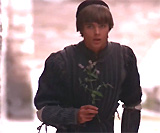
Romeo Montague (Leonard Whiting)
|
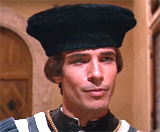
Count Paris (Roberto Bisacco)
|
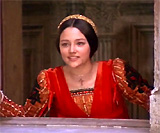
Juliet Capulet (Olivia Hussey)
|
- as preparations were made for the evening's costume
dance and feast among the Capulets, Count Paris
(Roberto Bisacco) mentioned his intentions to marry Juliet, the 14
year-old daughter of Lord Capulet (Paul Hardwick)
- in the next sequence, the introduction of the humorous
old Nurse (Pat Heywood) for the Capulets, and the young and beautiful teenaged Juliet Capulet
(Olivia Hussey) herself - first framed in a courtyard window;
her mother Lady Capulet (Natasha Parry) asked her daughter if she
was romantically interested in Paris: "Can
you love the gentleman?...Speak briefly, can you like of Paris'
love?", but Juliet was unsure
- on their way to the Capulet's
evening ball, Romeo and some of his
friends were planning to crash the festivities wearing disguises;
as they strolled along, Mercutio (John McEnery), a friend of the
Prince's, delivered a fanciful, imaginative Queen Mab speech about "the
fairies' midwife," who knew about the waking and sleeping,
troubling dreams of men
- during a marvelously-choreographed
sequence of dance at the ball, Romeo was immediately startled, entranced,
and smitten by the lady Juliet engaged in a hand dance - he exclaimed:
"Forswear it sight, for I ne'er saw true beauty till this night";
although Romeo was recognized,
Lord Capulet allowed him to remain although Tybalt voiced his objection
- a young boy Leonardo (Bruno Filippini) entertained
by singing "What Is A Youth?": ("What is a youth?
Impetuous fire. What is a maid? Ice and desire. The world wags
on. A rose will bloom It then will fade So does a youth. So do-o-o-oes
the fairest maid...")
- Romeo circled
around the perimeter of the crowd during the song, took Juliet's
hand from behind a pillar, and spoke his first words to her about
his passion - she responded equally as they sensually
pressed their hands together in the famous scene
- after interlocking
palms and hands, they also dared to kiss each other (Romeo: "Sin
from my lips! O trespass sweetly urged! Give me my sin again");
separately, both Romeo and Juliet realized that they had fallen
in love with someone in their family's enemy camp: (Juliet: "Oh!
Prodigious birth of love it is to me that I must love a loathed
enemy")
|
Interlocking Hands and Kisses
|
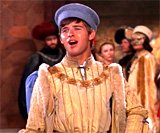
|
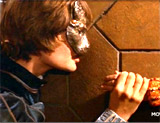
|
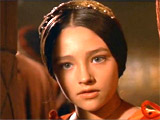
|
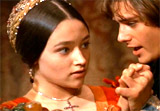
|
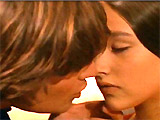
|
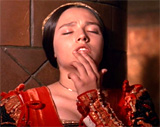
|
- the classic balcony scene: in the secluded Capulet
garden later that evening, Romeo saw Juliet upon her balcony in
front of her illuminated windows - he began to utter his famous
soliloquoy: "But soft, what light through yonder window breaks? O...it is my lady,
oh, it is my love. O that she knew she were...."; and then
he heard Juliet thinking to herself: "Ah,
me! O Romeo, Romeo, wherefore art thou, Romeo? Deny thy father
and refuse thy name; Or, if thou wilt not, be but sworn my love,
And I'll no longer be a Capulet...'Tis but thy name that is my enemy.
Thou art thyself, though not a Montague. What is Montague? It
is nor hand, nor foot, nor arm, nor face, nor any other part
belonging to a man. O, be some other name! What's in a name?
That which we call a rose by any other name would smell as sweet;
so Romeo would, were he not Romeo call'd, retain that dear perfection
which he owes without that title. Romeo, doff thy name, and for
that name which is no part of thee, take all myself." (She embraced
herself)
- when she realized he was in her presence,
she asked if he would swear that he loved her; fearing that she had
been too forward and "too quickly won," she promised to
deny her strong, profuse feelings of love so that he could woo her
more formally; she admitted that she should have been more restrained
about confiding her "true love's passion" but her love
was still innocent and true; Romeo swore his love for her by the
moon, but Juliet didn't want a variable love characterized by the
changing phases of the "circled orb"; she only wanted
him to "swear by thy gracious self."
Romeo complied: "If my heart's dear love, I swear! Oh, Juliet!" -
and they hugged and kissed passionately
- Juliet
wished to say good night (and she sweetly kissed Romeo good-night)
while fearing for his safety, and also so that the bud of their blossoming
love would have time to bloom and grow into a "beauteous flower," but
Romeo wished for her to remain a bit longer so they could exchange
loving vows; she pleaded that she had already given her vows from
her boundless bounty, as she confessed: "My bounty is as boundless
as the sea. My love as deep. The more I give to thee, the more
I have, for both are infinite"
- at the end of their evening, Juliet whispered that
if Romeo wished marriage, he should send word (of where and when)
the next day by messenger; he climbed the tree one more time
to kiss her - and they were still kissing as dawn's light arrived;
as he slipped down from the balcony - they extended their hands out to each other, as
she said goodbye: "Good night, good night! Parting is such sweet
sorrow that I shall say goodnight till it be morrow"
- the
wedding scene at the altar of the chapel the next day, arranged
secretly by Romeo's confessor and father figure, Friar Laurence
(Milo O'Shea), with the assistance of Juliet's bawdy Nurse
- on the afternoon of his marriage, a violent altercation
arose in the street between Tybalt and Romeo (with his best friend
Mercutio), leading to Mercutio's accidental death; in retaliation,
Romeo fought against Tybalt and killed him; Juliet was stunned
to learn of Tybalt's death - and that "Romeo's hand shed Tybalt's
blood"; the Prince banished the newly-wed Romeo from Verona, forever to
be exiled and never to return: "And for that offence, immediately
we do exile him hence. Let Romeo hence in haste, else, when he's
found, that hour is his last"
- before Romeo's flight from Verona to the nearby
town of Mantua, the controversial scene of the brief nudity of
the couple on their wedding night (the next morning) in Juliet's
bedchamber; in a few long-held shots, Romeo lay naked in bed with
Juliet, and then stood by a sunlit window; there was a split-second
instant of topless Juliet hastily rolling out of her shared bed
|
The 'Morning After' A Hasty Marriage
|

|
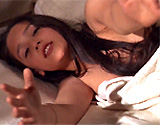
|
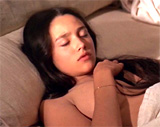
|
- Juliet's parents were unaware of the secret marriage
between Juliet and Romeo, and she was forced to agree to her parents'
wishes for an arranged marriage to Paris; Lord Capulet threated
to disown Juliet and never look at her again if she disobeyed;
at the same time, she and Friar Laurence schemed to have Romeo
and Juliet meet after a daring hoax; Juliet was to assent to an arranged
marriage to Paris, but then the day before she would swallow a
potion that would make her appear in a death-like sleep for 42
hours; then, following her burial in the Capulet family tomb, the
plan was for her to escape with Romeo
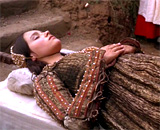
Juliet's Faked Death and Funeral
|
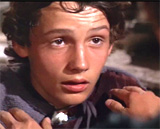
Balthasar's News to Romeo in Mantua That Juliet was Dead
|
- due to bad timing, and Romeo's servant Balthasar
(Keith Skinner) bringing news to him that Juliet was dead
(before Romeo was able to be alerted to the Friar's hoax by his courier),
Romeo rushed back to Juliet's tomb and discovered his 'dead' Juliet
- but still with color in her cheeks: ("Ah,
dear Juliet, why art thou yet so fair? Shall I believe that unsubstantial
Death is amorous, and that the lean abhorred monster keeps thee
here in dark to be his paramour?...)
- in a very dramatic sequence, he sobbed, took one
last look, gave her one last embrace, and a final kiss to seal
his "dateless bargain to engrossing death": ("Eyes
look your last. Arms, take your last embrace. And lips, o you the
doors of breath, seal with a righteous kiss a dateless bargain to
engrossing death"); he removed poison that he had brought, toasted to his love, swallowed
the kiss of poison, and kissed her hand before falling beside her: "Here's
to my love! Thus with a kiss, I die."
|
Romeo's Speech and Self-Poisoning
|
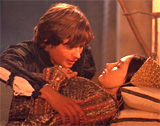
|
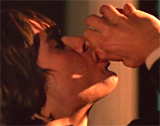
|
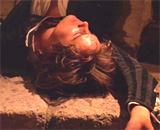
|
- shortly later, Juliet
slowly awakened from 'death' (her hand opened) and she
asked Friar Laurence about Romeo's whereabouts: "O comfortable
friar, where is my lord? I do remember well where I should be, and
there I am. Where is my Romeo?"
- after the Friar fled in fear,
she saw Romeo's body on the floor and the poison vial in his hand;
she chided Romeo for not leaving enough poison
for her; when she kissed his lips to see if there was any remaining
poison left on them, she found that his lips were "warm": ("What's
here? Poison, I see, hath been his timeless end. (She tried to drink
from the poison vial) O churl! Drunk all, and left no friendly drop
to help me after! I will kiss thy lips. Haply some poison yet doth
hang on them to make me die with a restorative. Thy lips are warm.
Oh, no, no!"); pathetically, she cried
out: "Oh, no, no!" - due to ill-timing, she knew he died only a few moments
earlier
- hearing more sounds of the watchmen, Juliet came
to her own triumphant, tragic and fateful end; faithful till
death, she picked up Romeo's dagger, stabbed herself in the chest,
and inevitably joined her love in marriage-death - she crumbled
over his body: "Then I'll be brief.
O happy dagger! This is thy sheath. There rust and let me die"
|
Juliet's Speech and Suicidal Stabbing by Romeo's
Dagger
|
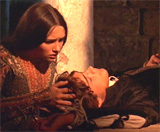
|
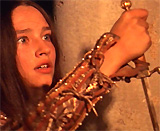
|
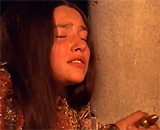
|
- to the sound of tolling bells, the final somber
and climactic epilogue included the double funeral procession
of the corpses of the two dead teens, who were carried up church
steps to be laid in front of the Prince, who chastised everyone
and pronounced judgment on the two feuding families:
("Where be these enemies? Capulet! Montague!
See what a scourge is laid upon your hate; That heaven finds means
to kill your joys with love; And I, for winking at your discords
too, Have lost a brace of kinsmen; All are punished. All are punished!
(ECHO: punished!))"
- the epilogue's off-screen narration ended the film:
("A glooming peace this morning with it brings. The sun for
sorrow will not show his head, For never was a story of more woe,
Than this of Juliet and her Romeo")
|
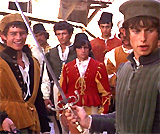
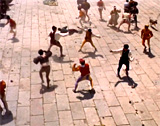
Opening Brawl Between Tybalt and Benvolio - the Montagues
and Capulets
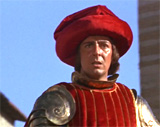
The Prince (Robert Stephens)
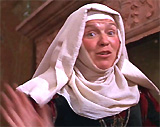
The Nurse (Pat Heywood)
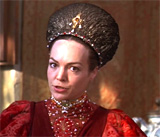
Lady Capulet (Natasha Parry)

Mercutio's 'Queen Mab' Speech
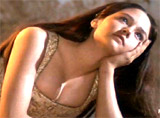
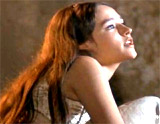
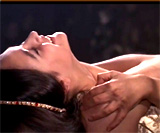
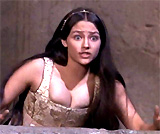


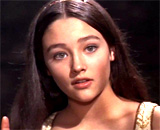
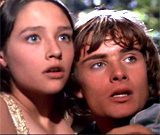
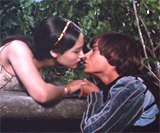
The Balcony Sequence
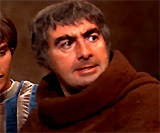
Friar Laurence (Milo O'Shea)
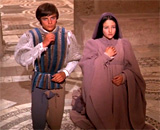
The Wedding
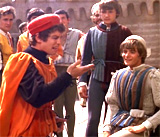
The Altercation in the Streets Between Tybalt, Mercutio, and Romeo
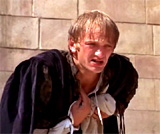
Mercutio's Death Scene
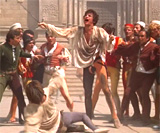
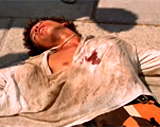
Tybalt's Death by Romeo's Sword
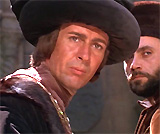
Romeo Banished by the Prince
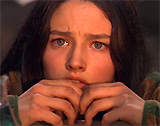
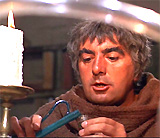
Juliet's Scheming Plot with Friar to Take 'Death' Potion

The Double Funeral Ceremony

The Prince's Pronouncement of Final Judgment: "ALL ARE
PUNISHED!"
|



























